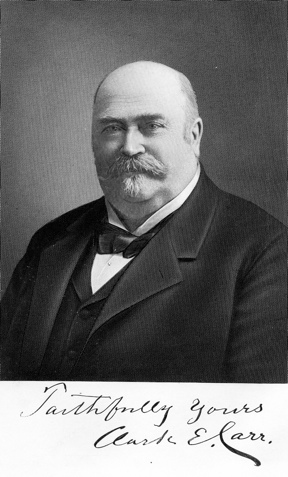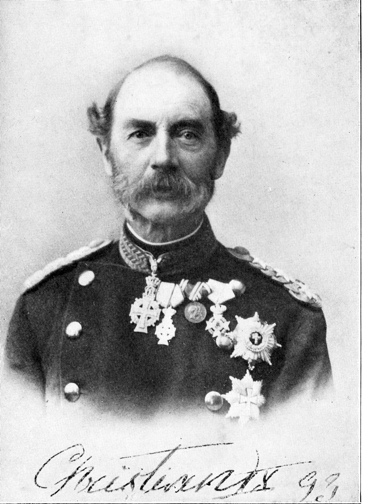Clark E. Carr: A Galesburger among royalty
By Lynn McKeown
Clark E. Carr was a big man
in town (in more ways than one) in the Galesburg of a century ago. He was a
lawyer, businessman, Galesburg postmaster, sometime newspaper editor, orator
and local Republican Party bigwig, and involved in many other local
organizations. The "most roly-poly fat man in town," as Carl Sandburg
called him, was also a Shakespeare enthusiast and fairly good writer, who late
in life published a number of books.
Carr's books include a
memoir called My Day and Generation, published in 1908. In another article I described
the western trip recounted by Carr in the opening, long chapter of this memoir.
It was a memorable trip, with Carr as a young man accompanying former Illinois
Governor Richard Yates and several other important men of the time on a trip
over the newly completely railway line to California. Highlights of that trip
included a visit to Brigham Young and the Mormon colony in Utah and a practical
joke played on Carr by Yates, who persuaded young Carr to take what turned out
to be a hair-raising ride on the cowcatcher of the locomotive as they descended
out of the mountains into Salt Lake City.
Other chapters in the book
included Carr's experiences with noted men and events of his time, including a
visit to the White House and an appearance by a disheveled Lincoln suffering
from the flu. (Stories about such notables as Lincoln, Douglas and Grant are
worked into the background of CarrŐs historical novel The Illini.) And some of the more
interesting chapters in My Day and Generation are about CarrŐs
improbable experiences with European royalty.
Carr apparently had
aspirations for a distinguished political career. He tried unsuccessfully to
get the Republican nomination for Illinois governor and was a popular orator at
public functions. Finally, in 1889, he was rewarded for his labors for the
Grand Old Party by being appointed by President Benjamin Harrison as minister
plenipotentiary (ambassador) to Denmark, where he served until 1893. Carr
describes many of his experiences while in this position in his memoir, often
with a dry, self-deprecating sense of humor that may have come from his
family's New England background.
 Carr's first official visit
to King Christian IX went well. He didn't know what to expect when he, an
American "from the Illinois prairie," encountered Danish royalty, but
the king proved to be an affable old gentleman who spoke perfect English, and
Carr also soon made friends with Crown Prince Frederick, a friendship which
seems to have lasted even when Carr later returned to Galesburg, when the two
corresponded. A social event that soon followed, however, proved potentially
embarrassing to the newcomer from Illinois.
Carr's first official visit
to King Christian IX went well. He didn't know what to expect when he, an
American "from the Illinois prairie," encountered Danish royalty, but
the king proved to be an affable old gentleman who spoke perfect English, and
Carr also soon made friends with Crown Prince Frederick, a friendship which
seems to have lasted even when Carr later returned to Galesburg, when the two
corresponded. A social event that soon followed, however, proved potentially
embarrassing to the newcomer from Illinois.
 Carr was invited to a royal
social gathering at the castle – a gathering that would include visiting
relatives from other countries – and since the king's children had
married into several other royal families, he would be surrounded by royalty,
including the Czar of Russia and the King of Greece, as well as the Danish
royal family. One of King Christian's sons had been installed as King of Greece
by the ŇGreat Powers,Ó and two daughters had married into the royal families of
Britain and Russia. They were all present, along with other princes and
panjandrums. (The king later told Carr, jokingly, that he and the queen were
"the grandfather and grandmother of Europe.")
Carr was invited to a royal
social gathering at the castle – a gathering that would include visiting
relatives from other countries – and since the king's children had
married into several other royal families, he would be surrounded by royalty,
including the Czar of Russia and the King of Greece, as well as the Danish
royal family. One of King Christian's sons had been installed as King of Greece
by the ŇGreat Powers,Ó and two daughters had married into the royal families of
Britain and Russia. They were all present, along with other princes and
panjandrums. (The king later told Carr, jokingly, that he and the queen were
"the grandfather and grandmother of Europe.")
Carr had been told that one
must never turn one's back on royalty. How was the small-town American Carr to
deal with this problem of royal etiquette? "What was I to do with my
back?"
as he exclaims in his memoirs. As it turned out, the Danish royal family was
notable for its informality and unstuffiness, Carr survived the ordeal with no
faux pas, and the Crown Prince laughed when Carr later told him of his supposed
predicament.
Carr had an especially
high, rather chivalric, regard for Queen Louise. Once, when on a trip to
southern Europe, he visited the island of Corfu, where there was an estate
belonging to her son, the King of Greece, and attempted to obtain a present for
her. The estate included an orchard, and Carr decided some of the fruit would
make a nice present for the Queen when he got back to Denmark. The gardener he
talked to was skeptical of what may have sounded like an improbable story, but
he finally obtained a basket of Mandarin oranges, which Mrs. Carr later
presented to the Queen. Maybe the Greek gardener just considered him another
one of those crazy Americans.
There's very little in
Carr's memoir about his official duties, possibly because there really wasn't
much to tell, since it was a peaceful time and American relations with the
small country of Denmark were friendly. On one occasion, however, the Queen had
a complaint.
On one of his visits to the
palace, the Queen took him to task. It seems that Danish women were getting
poor prices for their cabbages when they were shipped to New York because of a
recent tariff sponsored by "that horrid McKinley," as the Queen
called the Ohioan, then a U.S. Congressman. She hoped the ambassador could do
something about it. He told her he would try, and he passed along the complaint
to the U.S. government, though he knew nothing would come of it.
Carr seems to have been
very impressed with the Danish royal family, even though this was a time when
monarchs throughout western Europe were losing power and being reduced to
ceremonial roles. This royal family does seem to have had more intelligence and
character than some, however. (They were the subject of an interesting
documentary that appeared recently on PBS.) Perhaps the character and integrity
of the family was shown in an incident that occurred at a later time.
During World War II,
Christian X, who would have been a young man when Carr was attending social
functions and drinking champagne at the Danish court, was King of Denmark. He
seems to have been popular, often going for horseback rides on the streets of
Copenhagen. He looked the part of a Scandinavian king and showed some character
when the Nazi army rolled into Denmark. There wasn't much he or any of the
Danes could do as their small country was occupied. But when Jewish citizens
were ordered to wear a Star of David on their clothing, King Christian showed
his solidarity with them (and perhaps contempt for the Nazis) by also appearing
in public with a Star of David pinned to his coat, though he was not, of
course, Jewish. The king riding his horse through Copenhagen streets became in
many ways a "national symbol," and eventually, after the resistance
began to be more active, the Nazis confined the royal rider to his castle.
Carr's service in Denmark
ended when a Democrat, Grover Cleveland, became President in 1893. The rotund
Republican gentleman returned to his home on Prairie Street in Galesburg where
he lived the rest of his days, a popular speaker and writer, telling humorous
stories of his adventures around the U.S. and, during one four-year stretch,
among European royalty.
My Day and Generation is
available at local libraries, and quite nice copies at a reasonable price are
available from used book dealers on the Internet at such sites as abebooks.com
. Carr's writing style is rather formal and dry, but if you can adjust to that
and have an interest in history, his books are entertaining.
12/13/07